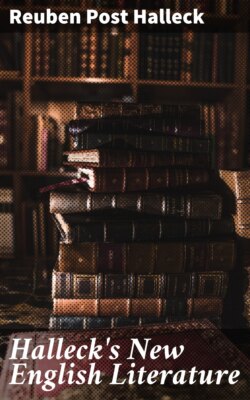Читать книгу Halleck's New English Literature - Reuben Post Halleck - Страница 25
На сайте Литреса книга снята с продажи.
SAXON FRENCH
Оглавлениеbody corpse folk people swine pork calf veal worth value green verdant food nourishment wrangle contend fatherly paternal workman laborer
English was enriched not only by those expressions, gained from the daily speech of the Normans, but also by words that were added from literary Latin. Thus, we have the Saxon "ask," the Norman-French "inquire" and "question," and the Latin "interrogate." "Bold," "impudent," "audacious"; "bright," "cheerful," "animated"; "earnings," "wages," "remuneration," "short," "brief," "concise," are other examples of words, largely synonymous, from the Saxon, the Norman-French, and the Latin, respectively. These facts explain why modern English has such a wealth of expression, although probably more than one half of the Anglo-Saxon vocabulary has been lost.
The Superiority of the Composite Tongue.—While we insist on the truth that Anglo-Saxon gained much of its wonderful directness and power from standing in close relations to earnest life, it is necessary to remember that many words of French origin did, by an apprenticeship at the fireside, in the field, the workshop, and the laboratory, equally fit themselves for taking their place in the language. Such words from French-Latin roots as "faith," "pray," "vein," "beast," "poor," "nurse," "flower," "taste," "state," and "fool" remain in our vocabulary because they were used in everyday life.
Pure Anglo-Saxon was a forcible language, but it lacked the wealth of expression and the flexibility necessary to respond to the most delicate touches of the master-musicians who were to come. When Shakespeare has Lear say of Cordelia:—
"Her voice was ever soft,
Gentle, and low; an excellent thing in woman,"
we find that ten of the thirteen words are Saxon, but the other three of Romance (French) origin are as necessary as is a small amount of tin added to copper to make bronze. Two of these three words express varying shades of quality.
Lounsbury well says: "There result, indeed, from the union of the foreign and native elements, a wealth of phraseology and a many-sidedness in English, which give it in these respects a superiority over any other modern cultivated tongue. German is strictly a pure Teutonic speech, but no native speaker of it claims for it any superiority over the English as an instrument of expression, while many are willing to concede its inferiority."
The Changes Slowly Accomplished.—For over a hundred years after the Conquest, but few French words found their way into current English use. This is shown by the fact that the Brut, a poem of 32,250 lines, translated from a French original into English about 1205, has not more than a hundred words of Norman-French origin.
At first the Normans despised the tongue of the conquered Saxons, but, as time progressed, the two races intermarried, and the children could hardly escape learning some Saxon words from their mothers or nurses. On the other hand, many well-to-do Saxons, like parents in later times, probably had their children taught French because it was considered aristocratic.
Until 1204 a knowledge of French was an absolute necessity to the nobles, as they frequently went back and forth between their estates in Normandy and in England. In 1204 King John lost Normandy, and in the next reign both English and French kings decreed that no subject of the one should hold land in the territory of the other. This narrowing of the attention of English subjects down to England was a foundation stone in building up the supremacy of the English tongue.
In 1338 began the Hundred Years' War between France and England. In Edward the Third's reign (1327–1377), it was demonstrated that one Englishman could whip six Frenchmen; and the language of a hostile and partly conquered race naturally began to occupy a less high position. In 1362 Parliament enacted that English should thereafter be used in law courts, "because the laws, customs, and statutes of this realm, be not commonly known in the same realm, for that they be pleaded, shewed, and judged in the French tongue, which is much unknown in the said realm."
